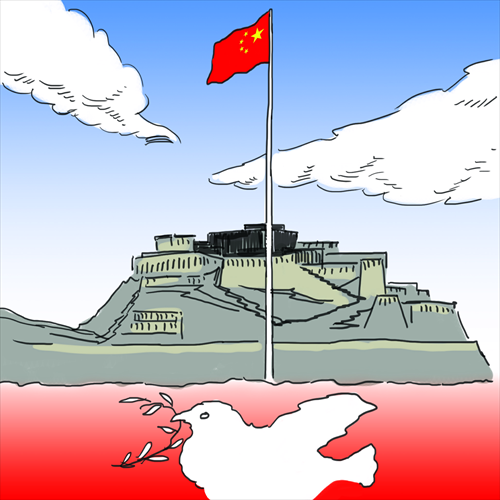Peaceful liberation created modern Tibet

Illustration: Liu Rui/GT
This year marks the 65th anniversary of Tibet's peaceful liberation. On May 23, 1951, an agreement signed between the Chinese central government and representatives of the Kasha, the former local Tibetan government, said that the Tibetan people should unite and drive out imperialist forces and return to the People's Republic of China, and that the Tibetan local government would assist the People's Liberation Army (PLA) to enter Tibet and consolidate the national defense, and pledged regional autonomy and religious freedom in Tibet.
Tibet, the previous underdeveloped southwestern region, has seen dramatic changes in economy, politics, social welfare, culture and environment after being liberated from the oppression of imperialism and feudalism. Since the democratic reform was carried out in 1959 and regional ethnic autonomy came into practice in 1965, Tibet has established the new socialist system, which opened a new chapter in Tibet's history.
The improvement in people's livelihood is one of the most outstanding achievements of Tibet's 65 years of development. The average life expectancy of Tibetans was 68.2 years in 2013, up from 35.5 years before the peaceful liberation. The region's GDP surged from 100 million yuan ($15 million) in the 1950s to 102.6 billion yuan in 2015. With the popularization of 12-year free education for all children, the region's education level has seen a sharp rise as well.
In the past 65 years, Tibet has been enjoying preferential policies in many fields including basic healthcare, social welfare and infrastructure projects.
As a landmark event in Tibet's history, peaceful liberation has laid solid foundation for the region to develop from a society oppressed by imperialism and feudalism to a modern civilization. The liberation also means that Tibetans, as a member of the great family of the Chinese nation, are forging ahead together with other Chinese ethnic groups.
However, the Western countries are always hyping human rights conditions in Tibet. Their accusations are groundless.
In fact, the development in Tibet represents the trend of historical evolution.
The abolishment of the feudal serf system in Tibet was a huge step forward. Serfs and slaves accounted for 95 percent of the overall population in Tibet in 1951, and were discriminated against, tortured or even killed by their lords. The peaceful liberation saved millions of serfs from their misery, and granted them with citizenship. Many serfs even became government officials. The liberation put an end to the theocratic rule in Tibet as well.
The West also colludes with some Tibetan radicals to instigate Tibet independence. In fact, the so-called Tibet independence movement is an outcome of the imperialist aggression against China. Specifically, the UK attempted to construct a buffer zone to protect its geopolitical interests in India, which was colonized by the UK at that time. To this end, the UK invaded Tibet in the 1860s and at the beginning of the 20th century.
India, after its independence, attempted to inherit the UK's strategic legacies in the region, and thus followed the UK to intervene in the interior affairs of Tibet. The US is also an active provoker of Tibet independence. Given its huge ideological disparity from China, the White House has been attempting to sabotage the integrity of China for a long time.
In recent years, China has been developing rapidly. Concerned about China's rise, the Western countries are colluding with the 14th Dalai Lama, who went into exile in India in 1959, and other radicals to instigate Tibet independence. However, the Tibetan separatists are merely chess pieces used by the West to counter China.
One of the most significant tasks for China at the current stage is to safeguard its national unity. To this end, the central government is advised to improve Tibetans' material and cultural life to a higher level.
Communications and exchanges between Tibetans and people from the rest of the country are also needed to foster the mutual understanding between the two sides and the well-being of the whole nation.
The author is director of the Institute of Tibetan Contemporary Studies at China Tibetology Research Center. opinion@globaltimes.com.cn